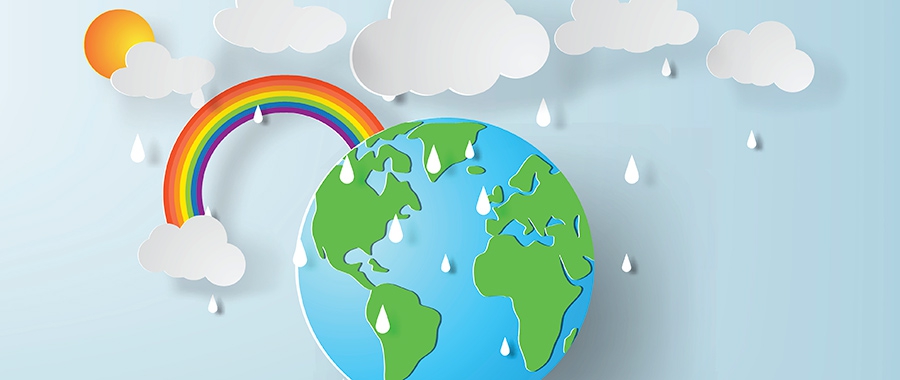The views expressed in our content reflect individual perspectives and do not represent the authoritative views of the Baha'i Faith.
The Baha’i teachings say “The essence of faith is fewness of words and abundance of deeds …” – Tablets of Baha’u’llah, p. 156. What do these words mean for our everyday life?
The first thing that may come to mind is our relationship with other people. We strive to be courteous, loving, fair, and trustworthy with family, friends, co-workers, and strangers—although this may not always be easy to do.
However, in our age, living what the Baha’i Faith teaches encompasses much more. For example, many actions we take every day have a direct impact on the environment and then indirectly on people around the world, even on future generations. Using energy, driving a car, and eating meat all contribute to greenhouse gas emissions which warm the Earth.
For instance: when we buy a T-shirt, we are involuntarily supporting extensive water use for the irrigation of cotton (often in drought prone areas), the application of toxic herbicides and pesticides which harm farm workers and the environment, the exploitation of people who grow and sow the cotton for the T-shirts, and greenhouse gas emissions that escape throughout all the stages of cultivation, production and transportation.
Global warming causes massive changes in the climate all over the world: including unprecedented heatwaves, severe droughts which harm agriculture, devastating floods, and more severe storms. Glaciers are melting, making sea levels rise because warmer water expands, and because of the contribution of water from the melting glaciers. Large coastal cities all over the world will become unlivable because of higher storm surges and flooding.
There is no alternative—we must change. But we are not powerless in the face of such problems.
Have you heard of the new interfaith initiative called “Living the Change?” Its website says:
Earth is a blessing. She supports life and is the basis of all our economies. She conveys beauty and evokes our recognition of something greater than ourselves. She is our temple, our mosque, our sanctuary, our cathedral. Our home.
As people of faith, we are committing to make changes in our own lives. Together, we come to you with a call to adventure on a journey towards sustainable living. We invite you to join us in Living the Change.
Living the Change has a spiritual mission—it provides inspirational messages from different religions to motivate their followers to tread more lightly on the Earth. When you visit the Living the Change website, you can click on your own Faith to open a motivational note that relates some of your Faith’s teachings to taking climate action. You can choose Interfaith, Baha’i, Buddhist, Catholic, Evangelical, Protestant, Hindu, Jewish, Muslim, and Quaker.
The Catholic motivational message, for example, is:
Addressing climate change and environmental destruction is an opportunity to fulfill the core values of our faith. As Christians, we are called to love one another, and especially the “least of these.” Our most vulnerable sisters and brothers are disproportionately affected by the climate crisis and environmental degradation. Solving it is a way to protect them, and our children and grandchildren after us, from increased sickness, hunger, and conflict. In Genesis, humanity is called to keep the garden God created, and Pope Francis teaches us that “living our vocation to be protectors of God’s handiwork is essential to a life of virtue; it is not an optional or a secondary aspect of our Christian experience.”(Laudato Si’, 217) As the urgency to solve our environmental crisis grows, we commit ourselves to protecting creation our common home.
When you click on Baha’i, you will get:
Baha’is believe in the oneness of humankind, that we are all one family in the sight of God. We know that poor people are affected first, and that future generations will suffer the most from the devastating impacts of climate change such as more severe heatwaves, droughts, floods, storms, and sea level rise. It is our responsibility to do all we can to reduce the suffering of our family members all around the world. We can all strive to live more environmentally responsible lives and to reduce carbon pollution caused by our lifestyles.
Baha’u’llah admonished us to lead a simple life. He wrote that a true spiritual seeker must ”be content with little, and be freed from all inordinate desire.” Moreover, He emphasized justice: “Whoso cleaveth to justice, can, under no circumstances, transgress the limits of moderation. The civilization, so often vaunted by the learned exponents of arts and sciences, will, if allowed to overleap the bounds of moderation, bring great evil upon men… If carried to excess, civilization will prove as prolific a source of evil as it had been of goodness when kept within the restraints of moderation…” The Universal House of Justice warns us of materialism and consumerism and writes “Every choice a Bahá’í makes … leaves a trace, and the moral duty to lead a coherent life demands that one’s economic decisions be in accordance with lofty ideals …” “Let deeds, not words, be your adorning” inspires environmentally responsible actions.
The website allows you to write down your personal motivation to change your habits, and then provides information about the three areas where all of us can make significant reductions to our contributions to climate change: Transportation, energy use, and diet. You can then choose to make one or more commitments for change in those areas.
Then you can download and share a card on social media with a picture and a quotation from the teachings of your Faith, and another card with your commitment(s). In this way, you can inspire others to Live the Change!
Living the Change has collected all commitments and presented them at the Global Climate Action Summit in San Francisco, which was held September 12-14, 2018. It will continue to collect commitments and everyone is encouraged to participate. Then, from 7-14 October, all people of faith are invited to celebrate the Week of Living the Change with local events in their communities around the world.
Of course, mitigating climate change also requires fundamental societal changes from the local and national to the international level. But the individual actions of millions of people will have a real effect on reducing carbon emissions and will help put in motion large social transformation. Would you like to become part of this global initiative? To make your commitment(s), visit the informational page about commitments for Living the Change.
















Comments
Sign in or create an account
Continue with Googleor